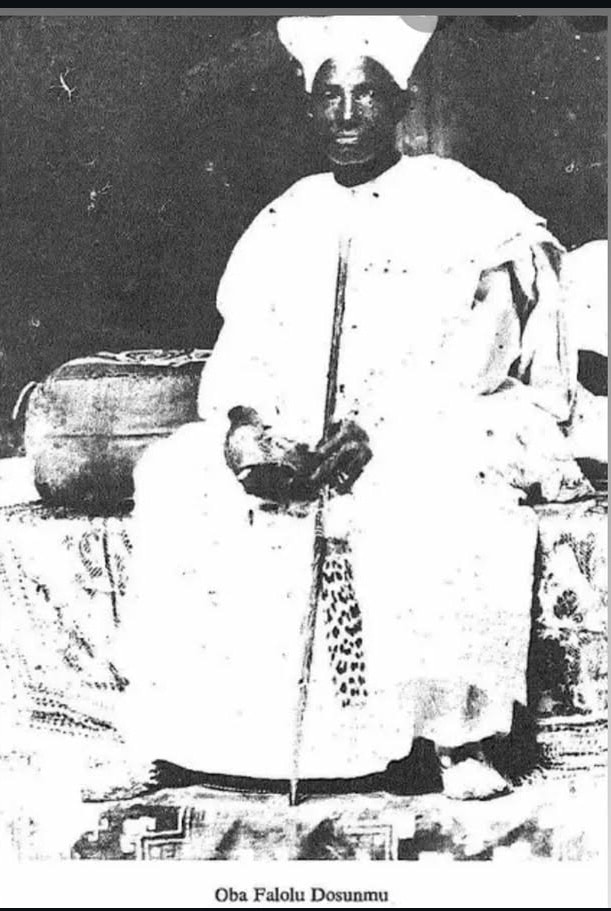A visionary leader who blended tradition with reform during Lagos’s colonial transition
Do you know that Lagos once had a monarch who redefined traditional leadership during the colonial era?
That ruler was Oba Falolu Dosunmu, the 10th Oba of Lagos, who reigned from 1932 to 1949. His time on the throne marked a pivotal period in the evolution of Lagos — a period when the British colonial system was deeply entrenched, yet traditional authority still played a crucial role in shaping the identity and governance of the people.
Background and Family Heritage
Oba Falolu Dosunmu came from one of the most prominent royal families in Lagos. He was a descendant of Oba Dosunmu (Docemo), the ruler who signed the Treaty of Cession in 1861, formally handing Lagos to the British Crown. This royal lineage connected Falolu directly to the Dosunmu dynasty, one of the key branches of the Lagos royal house.
Born in Lagos Island in the late 19th century, Falolu grew up at a time when British colonial influence was rapidly transforming Yoruba society. Yet, the prestige of the Obaship remained a cornerstone of local identity and governance. His early life immersed him in both indigenous Yoruba traditions and the British administrative order, giving him the dual insight that later defined his rule.
Education and Early Life
Unlike some of his predecessors, Oba Falolu received a measure of Western education, a rare privilege for traditional princes in the early colonial period. This exposure to British-style education enabled him to communicate effectively with colonial administrators while maintaining his deep understanding of Yoruba customs.
Before ascending the throne, Falolu worked in public and administrative capacities that exposed him to governance and community organisation. This experience became invaluable during his reign, especially as Lagos evolved from a traditional settlement into a rapidly urbanising colonial capital.
Accession to the Throne
Falolu Dosunmu ascended the throne in 1932, succeeding Oba Eshugbayi Eleko, whose reign had been marked by intense conflict with the British colonial government. The colonial authorities initially viewed the Obaship as a symbolic office, but Falolu set out to prove otherwise.
His reign restored stability and dignity to the throne after years of political turbulence. Unlike his predecessor, Falolu adopted a diplomatic approach — working with both his chiefs and colonial administrators to preserve the relevance of traditional authority in a changing society.
Reforms and Achievements
Oba Falolu Dosunmu was known as a reform-minded monarch who understood the importance of record-keeping, administration, and cultural preservation. Among his key contributions were:
1. Establishment of Official Obaship Archives:
Falolu initiated the documentation of native laws, customs, and administrative meetings between the Oba, his chiefs, and the colonial government. These records became part of the earliest organised archives for a traditional institution in Nigeria.
2. Strengthening of the Obaship Institution:
He introduced reforms that enhanced the autonomy and influence of the Oba’s court, ensuring that the traditional council (the Iga Idunganran) continued to play a vital role in decision-making.
3. Promotion of Cultural Identity:
During his reign, Falolu encouraged the preservation of Yoruba traditions in Lagos. He supported community festivals and indigenous art, ensuring that colonial modernisation did not erase cultural heritage.
4. Administrative Cooperation:
Despite colonial constraints, Falolu maintained a delicate balance between the traditional ruling structure and the British administrative system, earning him respect from both colonial officers and his subjects.
Legacy and Impact
Oba Falolu Dosunmu’s reign, which lasted 17 years (1932–1949), is remembered as a period of institutional consolidation for the Lagos monarchy. His efforts ensured that the Obaship remained relevant in the face of British colonial expansion and urbanisation.
He is often credited with laying the groundwork for future monarchs, including Oba Adeniji Adele and Oba Adeyinka Oyekan, who continued his mission of blending tradition with modern governance.
Today, Falolu is honoured as one of the most historically significant Obas of Lagos — a monarch who understood the importance of adaptation without surrendering cultural sovereignty. The archives he established remain a vital resource for historians studying the evolution of governance in colonial Lagos.
Death and Succession
Oba Falolu Dosunmu passed away in 1949, marking the end of a distinguished reign. He was succeeded by Oba Adeniji Adele II, who continued his policy of modernising the monarchy while maintaining Lagos’s Yoruba identity.
Oba Falolu Dosunmu was more than just a monarch; he was a reformer, cultural custodian, and statesman who bridged the gap between tradition and colonial modernity. His reign stands as a testament to how indigenous leadership adapted to survive within the frameworks of foreign rule — preserving the dignity of the Yoruba crown in Lagos even under British oversight.
References
1. National Archives of Nigeria – Lagos Colonial Administration Records (1932–1949).
2. Kristin Mann, Slavery and the Birth of an African City: Lagos, 1760–1900 (Indiana University Press, 2007).
FOLLOW US ON:
FACEBOOK
TWITTER
PINTEREST
TIKTOK
YOUTUBE
LINKEDIN
TUMBLR
INSTAGRAM































